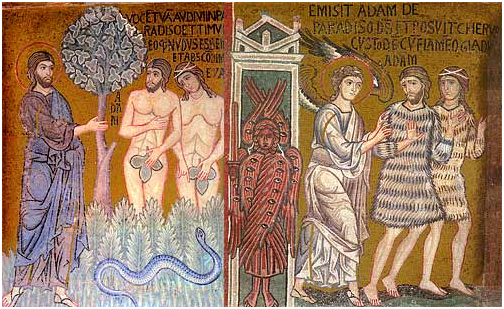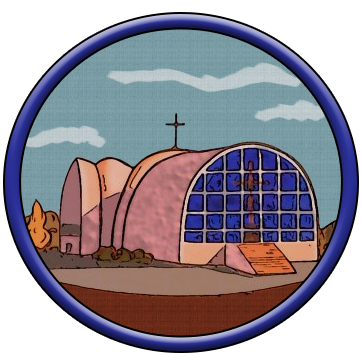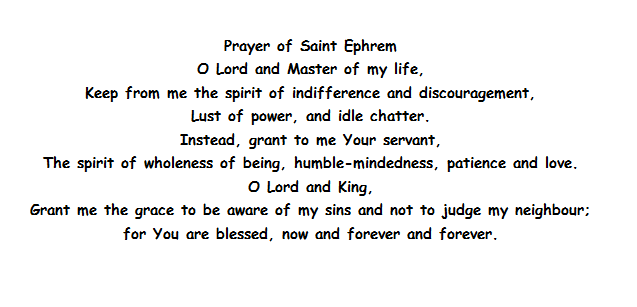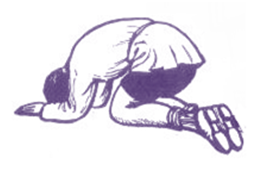Cheese-Fare Sunday

Expulsion form Paradise
This Sunday is known by several names: Cheese-fare, Adam’s Lament, and Forgiveness Sunday. Cheese-fare is derived from the past practice of fasting from all meat, egg and dairy products for 40 days. Today, we have two days (Monday the 1st day of Lent and Good Friday) of a strict fast, which is abstinence from meat, eggs and dairy products and having ONE full meal on that day.
This final Sunday before Great Lent has two themes: it commemorates Adam’s expulsion from Paradise, and it accentuates our need for forgiveness. There are obvious reasons why these two things should be brought to our attention as we stand on the threshold of Great Lent.
One of the primary images the Church sets before us during the Great Fast is that of the return to Paradise. Lent is a time when we weep with Adam and Eve before the closed gate of Eden, repenting with them for the sins that have deprived us of our free communion with God. But Lent is also a time when we are preparing to celebrate the saving event of Christ’s death and rising, which has reopened Paradise to us once more (Luke 23:43). So sorrow for our exile in sin is tempered by hope of our re-entry into Paradise.
The second theme, that of forgiveness, is emphasized in the Gospel reading for this Sunday (Matthew 6: 14-21) and in the special ceremony of mutual forgiveness at the end of the Vespers on Sunday evening. Before we enter the Lenten fast, we are reminded that there can be no true fast, no genuine repentance, no reconciliation with God, unless we are at the same time reconciled with one another. We do not travel the road of Lent as isolated individuals but as members of a family. Our asceticism and fasting should not separate us from others, but should link us to them with ever-stronger bonds.
Today’s Gospel tells us that there are two things we must do in order to complete the Journey of the Great Fast. First, we must fast. Fasting is an ancient practice that dates back even to pre-Christian times. Fasting allows us to empty ourselves in order to be filled with God and God’s spirit. We do not only fast from food, in today’s world, we also need to fast from television, radio, internet, computer games or anything else that prevents us from hearing God’s voice.
Second, we must forgive. Forgiveness means we let go of resentment and hurt because someone has offended us or hurt us. In a way, Forgiveness is like fasting because when we let go of hurts, it empties a space in our heart where we can meet God.
Did you know that the Great Fast actually begins this Sunday evening at Vespers? Forgiveness Vespers is a deeply beautiful service that expresses the spirit of the Great Lent. We are challenged to enter the Great Fast by forgiving and asking forgiveness of each other. We are called to express our love for God by forgiving those who have wronged us; we are also called to examine our lives and seek forgiveness from those we have hurt.
Our preparations for Great Lent have ended… We stand before God and realize that we belong to His Kingdom and it is our only goal. We also realize that we are sinners and live in the darkness of this world. We call out for help to the only One who can help us. We repeat the Lenten Prokimen 5 times and with that, Lent begins. The lights in the church are extinguished and the bright vestments are replaced with dark ones. The Resurrectional tone of the singing changes to the Lenten tone. The Prayer of St. Ephrem with its prostrations is prayed for the first time.
At the conclusion of the service, the faithful approach the priest and each other to ask for mutual forgiveness while the choir sings the liturgical hymns of Easter, for even though we must journey through 40 days of darkness, we see the light of the Resurrection beckoning brightly.
Excerpted and adapted with appreciation from:
Greek Orthodox Archdiocese of America Forgiveness (Cheesefare) Sunday
UCREC Saskatoon


